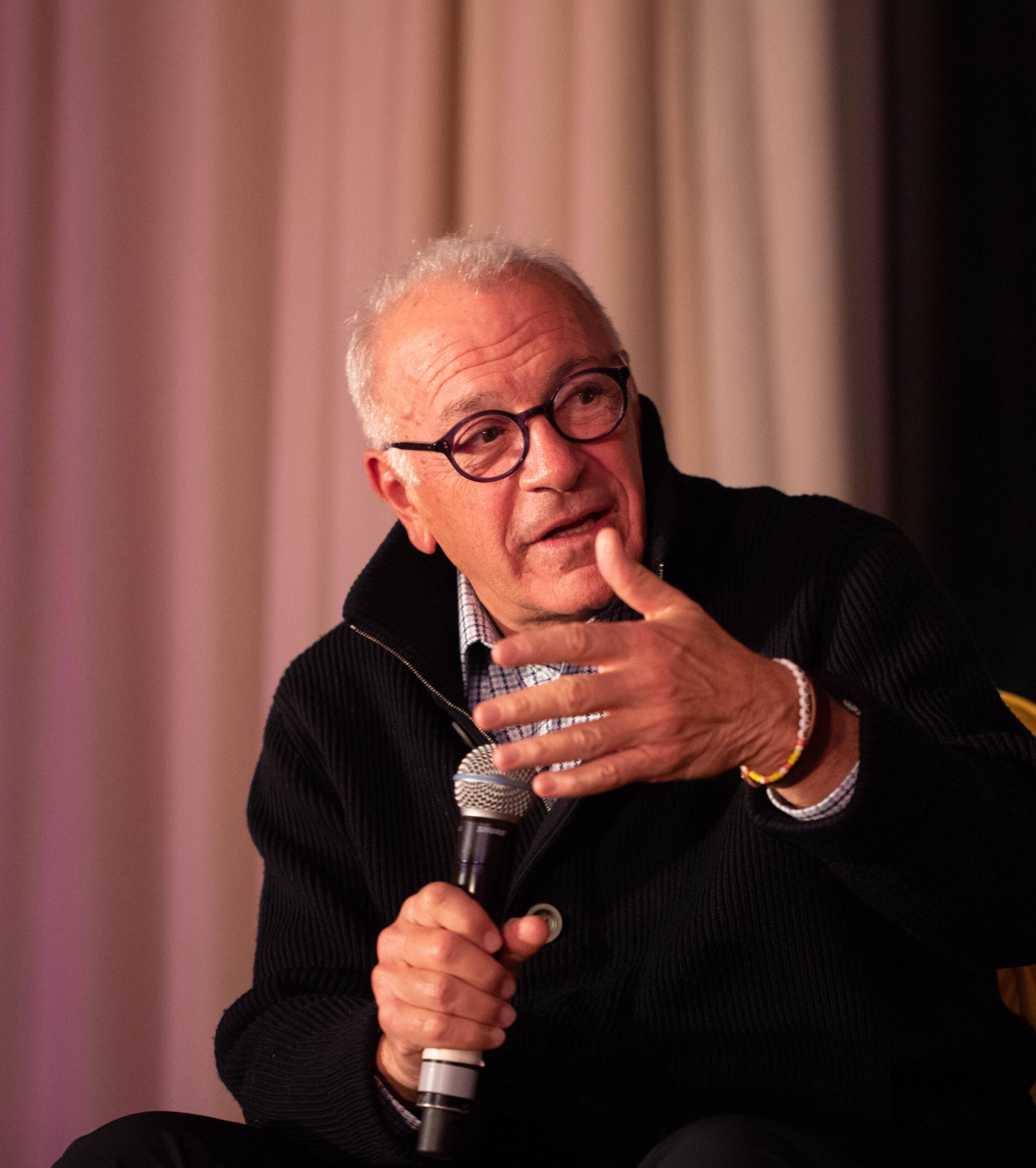
A ROADMAP
TO REAL ESTATE'S FUTURE
Reflections from Disconnect 2023

Dear Real Estate Industry,Does your future feel muddled? No wonder — bank failures, a war in Europe, sky-high inflation, rising interest rates, aggressive central bank intervention, and a wobbly global economy all play their part. And who knows what the next shoe to drop will be.Our professional and personal lives have been shaken by these unpredictable, rapidly changing events. Where will it all shake out for us as professionals, and as an industry?In the desert of Palm Springs, California, from February 27- March 1, 70 industry leaders tried to figure that out together at this year’s Inman Disconnect. The collective wisdom of this savvy group mapped out what the industry will look like within a year — as well as how it must act to confront the inevitable changes that are coming.I urge everyone to read and share the full Roadmap to the Future that Inman is publishing below.On behalf of Disconnect 2023,Brad Inman
THE INDUSTRY'S CRYSTAL BALL
FOR 2023 AND BEYOND
Each year, many of real estate’s top executives, entrepreneurs and investors gather at Inman’s Disconnect conference to chart a path for the industry’s future. In the past, these discussions have been private, and the attendees’ comments were anonymous.For the first time, Inman is able to reveal the contents of these conversations in detail, publishing them here to help the broader industry navigate the choppy waters of the year ahead.Their key insights and predictions are presented below on the following four topics: the market correction, the messy pandemic fallout, the proptech meltdown and the industry’s megalawsuits.
LIFE AFTER THE MARKET CORRECTION

From the stage at Disconnect, EXIT Realty CEO Tami Bonnell encouraged executives to lean on top-producing real estate agents amid economic uncertainty, and warned that a wave of newcomers who entered the profession at a high point in the market could be undone this year.“Top producers do better in a market shift, because they know what to do and they’ve been doing the right stuff all along,” Bonnell told conference attendees on a calm Palm Springs evening. “There’s a lot of people that were only doing a handful of transactions, and were reactive and came in because the market was hot, that are going to disappear.”The ongoing market correction will spell doom for some younger companies and agents, Bonnell predicted. Other firms will get scooped up in mergers and acquisitions as investors and competitors look to pounce on the present environment, she added.
On the other side of the market shift, however, real estate will face new challenges — and intriguing opportunities, she added during a wide-ranging discussion of market challenges.Local governments may open up more opportunities for accessory dwellings and affordable housing. Seniors will take advantage of FHA-backed home-equity conversion mortgages, freeing up more inventory in the long run. And fewer properties will be deemed insurable due to climate change, meaning buyers won’t be able to take out loans to buy them, Bonnell advised.Bonnell’s predictions on the stage at Disconnect kicked off days of discussions by some of North America’s top real estate leaders. Read their thoughts from the event below.
PREDICTIONS & INSIGHTS
from Disconnect 2023
AFTER THE MARKET CORRECTION
Laura Gottesman
Broker/owner, Gottesman Residential
“The cream will rise to the top. Agents that got in the business because they thought it was easy money will be gone. Realtors will need to be sharp, educated and on their best foot.”
AFTER THE MARKET CORRECTION
Chris Heller
Chief real estate officer, OJO
“20 percent fewer brokerage offices/companies. Average size of teams will grow by 25 percent to 40 percent. Interest rates will find a new range for the next decade fluctuating between 4.5 percent and 5.5 percent.”
AFTER THE MARKET CORRECTION
Jeremy Crawford
CEO, First Multiple Listing Service
“Mortgage reform is a must to solve affordability and allow for new ways to lend to get out of the seller lock with today’s rates. Fractional ownership by investors will replace reverse mortgages and HELOCs. States without Proposition 13 will displace fixed income owners with tax increases to the point of bank repossession and foreclosure.”
AFTER THE MARKET CORRECTION
Jeff Meyers
CEO, Zonda
“We believe new-home will be a large percentage [of inventory] over the next five years, just because so many households in America are on these low, low fixed-rate mortgages. And homebuilding is a great solution.”

AFTER THE MARKET CORRECTION
Peter Palmisano
Partner, FactoryOS
“The carpenters know that in the next 10 years, 40 percent of their membership are going to retire out. If you think we’ve got a housing problem now, for the next 10 years, there’s not going to be [enough] labor, because they can’t bring people in. They take 100 people through their apprentice program, and maybe four to five of them stick. So we’re going to have a huge labor problem in terms of construction — especially as it relates to housing.”
AFTER THE MARKET CORRECTION
Sara Sutachan
SVP, California Association of Realtors
“Sustained lower level of overall sales because of sub-3-percent mortgage handcuffs. Assumability disruptors enter the market. Rates at 5.75 percent by the end of 2023.”
AFTER THE MARKET CORRECTION
Roger Boutilier
CEO, Nova Scotia Association of Realtors
“Rates will be where they [were in late February] at the end of Q4 of 2023. They may ease into Q1 and Q2 of 2024. Rates normalize between 4 percent and 5 percent.”
AFTER THE MARKET CORRECTION
Andrew Flachner
President, RealScout
“December rates: 4.5 percent.”
AFTER THE MARKET CORRECTION
Jerimiah Taylor
VP of real estate and mortgage, OJO
“Rates: 30-year mortgage at 5.0 percent to 5.5 percent by end of year. Prices: plus or minus 2 percent year over year. Sales volume: 4.25 million homes sold. NAR membership: 1.35 million or under.”
AFTER THE MARKET CORRECTION
Mike Volkema
Chairman of the board, MillerKnoll
“You probably can’t predict easily what’s going to happen, but every good leader should probably have in their top drawer a scenario plan that says, what are the first five levers that I’m going to pull? Because the only red thread when an upheaval happens is your business contracts.”

AFTER THE MARKET CORRECTION
Rick Treviño
Partner, Loyal Texas Properties
“Rates should have never gone so low. We got spoiled.”
AFTER THE MARKET CORRECTION
Shelley Specchio
CEO, MIBOR Realtor Association
“Rates in December: 5 percent. Median price: flat. Number of transactions: 2019 levels.”

AFTER THE MARKET CORRECTION
Andrew Binkley
President, Constellation1
“One thing we found that’s constantly underestimated is how different real estate is from other asset classes — particularly residential real estate. There’s huge amounts of emotional connection to home. It fulfills so many different needs. There’s a huge amount of government regulation. And so a lot of the predictions of disruption, either in an up market or down market, are totally overwrought.”
LIFE AFTER THE MESSY COVID FALLOUT

In the last century, the U.S. emerged from a global pandemic to a cultural and technological boom known as the Roaring ’20s.Zillow’s Errol Samuelson believes the real estate industry may be standing on the precipice of another extraordinary transition today as the pandemic has driven consumers even more toward seamless online experiences, and companies have begun to invest in the next generation of artificial intelligence.The market may be down now as the mortgage-rate jolt of 2022 still ripples through the industry, said Samuelson, the Seattle-based tech giant’s chief industry development officer. But under the surface, he believes the seeds of a big wave of home demand are being sown as the largest group of young adults in decades matures into their peak homebuying years.Spurred by these homebuyers’ increasingly digital-first expectations — and with a boost from AI technology and years of pre-existing investment — Samuelson believes real estate companies may be on the verge of perfecting the long-rumored, fully digitized home transaction that Brad Inman once referred to as a "latte transaction."“But all of these innovations — a bunch of different companies are going to talk to each other — and it’s going to happen,” Samuelson told a group of real estate executives and investors at Disconnect. “Your 'latte transaction' is going to happen this decade.”Before then, however, brokerages and other companies are still navigating the fallout of the pandemic’s effect on the workplace and business climate. Disconnect attendees share their thoughts below.
PREDICTIONS & INSIGHTS
from Disconnect 2023
AFTER THE COVID FALLOUT
Tim Heyl
Founder and CEO, Homeward
“A lot of people are in long-term office leases. They want to make use of them. They want to bring their teams together during this crazy time of change. And I think we all sort of agreed that it would be better to be in person during a crazy time of change. And so we think a lot more companies will start moving towards that requirement to come back in by 2024. Not all — my company’s not going to do it — but I think that most companies will get there.”

AFTER THE COVID FALLOUT
Andrew Binkley
President, Constellation1
“Financial flexibility: It means your business can switch from being growth-oriented to being profit-oriented, or was profit-oriented all along. … If growth is the only strategy, then when things change, your business is really going to be under threat.”
AFTER THE COVID FALLOUT
Kendall Bonner
Team leader, Kendall Bonner Team
“As our generations that didn’t grow up with AI continue to retire out of the business, you have this younger generation coming up that is going to basically demand it to make themselves more efficient, and also just to help solve problems.”
AFTER THE COVID FALLOUT
Dan Siegler
Head of industry, real estate, Google
“The cities will complete their comeback. There won’t be a single ‘winner’ with regard to office and work models, but hybrid environments (X days per week in office and X days per week working remotely) will become more common.”
AFTER THE COVID FALLOUT
Jerimiah Taylor
VP of real estate and mortgage, OJO
“Less than 50 percent of pre-Covid office occupancy. Emergence of condo conversion projects. Hourly workers return to the office. Knowledge workers remain highly remote.”
AFTER THE COVID FALLOUT
Vanessa Bergmark
CEO, Red Oak Realty
“The sales force was struggling more deeply [with remote work] based on that interpersonal connection and what goes on in a sales team to be motivated. Sort of an externally-driven individual, with the way their psychology works, vs. the administrative [employee] who was completely, perfectly fine about staying home forever.”

AFTER THE COVID FALLOUT
Chris Heller
Chief real estate officer, OJO
“Where people live and why they live there has been fundamentally changed, as has the modern workplace. The wealth gap has increased and I don’t see a reset any time soon. We will truly experience ‘rate lock’ for the first time at a meaningful level.”
AFTER THE COVID FALLOUT
Rick Treviño
Partner, Loyal Texas Properties
“Realtors got too relaxed and are now wanting to work from home, making offices ghost towns.”
AFTER THE COVID FALLOUT
Scott Martino
CEO, Endpoint
“We tend to overreact. And those who can kind of stay the course and think through it, and not get caught in the hype cycle, will tend to persevere over the long term.”
AFTER THE COVID FALLOUT
Tim Heyl
Founder and CEO, Homeward
“I think at the end of the day, one of my biggest takeaways is that being in the middle [partly in-person and partly remote] is really hard, and when you make a commitment to one or the other, you can really, really succeed.”
LIFE AFTER THE PROPTECH MELTDOWN

Court Cunningham doesn’t want to sound too dramatic. But it truly is time to “adapt or die” for real estate tech startups, he says.The founder and CEO of Orchard told Disconnect attendees that the era of nearly free capital produced a great number of companies that will not survive this new era of higher interest rates and more skeptical investors.“I think that there’s going to be innovation forced by a real cost of capital,” Cunningham said. “I think there’s going to be pain forced by it.”While the advent of improved artificial intelligence holds promise for making many tech businesses better and more valuable, its specter may loom large over other proptech services, which Cunninham says may be made obsolete by AI.Before the next wave of AI innovation hits, however, many proptech companies are in a fight to survive the market downturn. Entrepreneurs are racing to become profitable and weighing painful options like taking a down round in funding. Investors and entrepreneurs shared their thoughts at Disconnect.
PREDICTIONS & INSIGHTS
from Disconnect 2023

AFTER THE PROPTECH MELTDOWN
Jon Hong
Partner, Fifth Wall Ventures
“I talk to many founders and entrepreneurs that do have venture-capital money. It’s painful to take a down round [in valuation]. But really, dilution is better than death. It really is about getting to the other side. Because if you do get there, and no one else has made it, you kind of win by default.”
AFTER THE PROPTECH MELTDOWN
Jeremy Crawford
CEO, First Multiple Listing Service
“Private equity companies will start buying up companies as fire sales in the next 18 months. Brokerages that tried to be tech companies but didn’t profit in 2019 to 2022 will go belly up (i.e. Compass, Opendoor, Purple Brick, Knock, etc.).”
AFTER THE PROPTECH MELTDOWN
Roger Boutilier
CEO, Nova Scotia Association of Realtors
“Companies with earnings will survive and thrive going forward. The decade of free money is over. A whole generation will have to adjust to this. Real estate investment is cyclical, and we are in a downturn. In one to three years, we will trend up again.”
AFTER THE PROPTECH MELTDOWN
Chris Heller
Chief real estate officer, OJO
“There’s two types of companies [we can say] with a high degree of confidence will survive, and those are the companies that are either profitable, or the ones that are on a path to profitability. If a company is not in one of those two categories, they’re in a really tough spot, because there isn’t capital readily available to help them get through to one of those two stages.”

AFTER THE PROPTECH MELTDOWN
Andrew Binkley
President, Constellation1
“Companies with flexible cultures and prudent finances will flourish. Growth needs to be a tactic, not a strategy.”
AFTER THE PROPTECH MELTDOWN
Jerimiah Taylor
VP of real estate and mortgage, OJO
“Who and how many will survive? Homes.com will spend their way into the Top 5 portals in traffic. Q2 and Q3 of 2023 will be mergers-and-acquisitions heavy. Balance-sheet businesses will pivot to capital-light options. iBuyers become marketplaces, lead generation businesses, etc.”
AFTER THE PROPTECH MELTDOWN
Laura Gottesman
Broker/owner, Gottesman Residential
“Proptech will consolidate, and remain effective for lower price points and the general market.”
AFTER THE PROPTECH MELTDOWN
Rick Treviño
Partner, Loyal Texas Properties
“Sorry, but there is a huge difference in raising money vs. making money.”
AFTER THE PROPTECH MELTDOWN
Omer Granot
CEO, Localize
“There are two ways to approach developing software. Generally you could identify the problem and then find the right technology to solve it. Or you can do it the other way: ‘There’s a good technology; let’s try to find a problem that fits the technology.’ And there’s a lot of software companies today taking the latter approach.”
AFTER THE PROPTECH MELTDOWN
Jon Hong
Partner, Fifth Wall Ventures
“The last two years, it’s been all about market share. And from that perspective, now it’s about driving a lot of growth in profitability because there’s just less capital going around.”
LIFE AFTER THE INDUSTRY'S MEGALAWSUITS

An industry transformed. That’s no less than what Kendall Bonner expects, and no less than she believes brokerages should prepare for, should the lawsuits threatening to upend how the real estate industry handles commissions be successful.If so, it will lead to a significant reduction in the number of agents, the number of brokerages and the number of MLSs, the leader of the Kendall Bonner Team told the audience at Disconnect.“Now, is all of that a bad thing? Perhaps not,” Bonner said. “Maybe we do need to clean up house. Maybe we do need fewer individuals who are coming in and playing in our space, as opposed to being professionals in our space.”But in the meantime, the implications would be substantial — particularly for buyer’s agents and how they make their money.Some alternative solutions could help soften the blow, Bonner said. The residential industry could explore other models of compensation, such as how other countries handle compensation, or how the commercial real estate industry does business between buyers and sellers.“You know, getting paid is important,” Bonner said. “None of us should be working for free. But at the same time, it’s probably about time that we get more realistic about our services — and about how we get paid for them.”
PREDICTIONS & INSIGHTS
from Disconnect 2023
AFTER THE MEGALAWSUITS
Jackie Soto
Broker, eHomes
“The barrier to get into our industry, it’s very low. But what we’re seeing, and what we predict, is that that bar will be raised hopefully, and education will also be increased for our industry.”

AFTER THE MEGALAWSUITS
Paul Boomsma
President and CEO,
Leading Real Estate Companies of the World
“I look on the commercial side in the U.S., which is where we would probably want to go a little bit closer [if the lawsuits succeed]. Typically on, what we call, a tenant-rep side, is you're representing your client. Frequently they’re in the offer, whether it’s a purchase or even a retail lease or office lease. They’ll actually build it into the offer and the landlord or the seller will pay the fee to the tenant-rep or the buyer’s rep. ... It’s kind of the same thing that [the lawsuits are] pushing for, and it already is in existence on the commercial side. It’s just that the number of commercial transactions typically occur between people who are more educated in the process.”
AFTER THE MEGALAWSUITS
Veronica Figueroa
Team leader, eXp Realty
“Of course, the buyers must be protected. But I also feel like the barrier to entry into our industry is what concerns me, where I don’t feel buyers are protected if we — Florida’s one of the lowest barriers to entry: 63 hours of education. ... The lack of education or requirement for the professionalism within our industry concerns me.”
AFTER THE MEGALAWSUITS
Jeremy Crawford
CEO, First Multiple Listing Service
“The NAR commission lawsuit, if lost, will bankrupt NAR and association-owned MLSs, paving the way for CoStar to take over the residential MLS industry as a monopoly.”
AFTER THE MEGALAWSUITS
Jerimiah Taylor
VP of real estate and mortgage, OJO
“Cooperation will continue. Compensation will be lower and funded more transparently. Lower-income consumers will be most impacted because of current lending regulations that limit third-party contribution to closing fees.”
AFTER THE MEGALAWSUITS
Chris Heller
Chief real estate officer, OJO
“Worst case scenario: 40 percent fewer agents. 40 percent to 50 percent reduction of commissions. Net-negative impact on first-time and low-income buyers.”
AFTER THE MEGALAWSUITS
Cathy Treviño
Managing broker for Texas, Side
“I don’t believe broker cooperation will stop. It may change, but for the better of the industry.”
AFTER THE MEGALAWSUITS
Shelley Specchio
CEO, MIBOR Realtor Association
“Brokers help agents articulate their value proposition. Buyers agency agreements. Flat fees.”
AFTER THE MEGALAWSUITS
Rick Treviño
Partner, Loyal Texas Properties
“Eek! Hopefully it will not stick.”

AFTER THE MEGALAWSUITS
Sherry Chris
CEO of Expansion Brands Portfolio, Anywhere
“The fact that the consumers that are leading this don’t understand the depth of our industry, that is a potential problem. … If we don’t have consumers buying houses, we’re all out of business. And so what are we going to do as leaders to make sure that we explain what’s going on with the transaction, and have the consumers feel comfortable, so these types of lawsuits don’t happen in the future?”
INMAN SELECT
Become a member of Inman Select.
For independent, reliable news coverage at the forefront of the industry plus essential how-to advice for growing your business, join Inman Select today.
© 2023 Inman. All rights reserved.